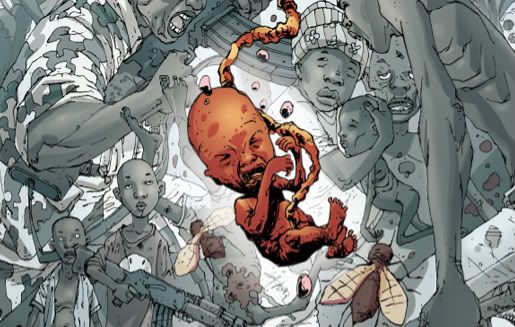Light the Lanterns of Triumph: Jog finally bought and read a comic from 10/22
/![]() Unknown Soldier #1
Unknown Soldier #1

This is the newest ongoing series to come out of Vertigo, a reimagining of the Robert Kanigher/Joe Kubert concept as a saga of violence in Uganda, circa 2002. It's bloody, tense and not a little pulpy, something a bit more bombastic than what we've been getting lately from the publisher. It does bring to mind an older Vertigo project, though, and I'm not talking about the 1997 Garth Ennis/Kilian Plunkett take on the same property.
No, this thing really brings to mind Congo Bill, as in the 1999-2000 miniseries from writer Scott Cunningham and artist Danijel Zezelj. It was also an Africa-set revival of an old adventure comic -- specifically the late '50s/early '60s Congorilla iteration of the older Congo Joe jungle feature -- also filled with guns and toughness and grit and suspense and angst and people who kill. Hell, both projects even sport Richard Corben cover art, although he's on variant duty this time, I think only for issue #1; the very welcome Igor Kordey provides standard covers.
I sort of liked Congo Bill; it was one of those comics that, through its black ops storyline, sought to say things about violence and politics. Granted, it was also one of those updates of a fantastical comic wherein the fantasy elements are avoided as much as conceivably possible, and treated mainly as elements of a charged metaphor - I think colonialism and its legacy was an active concern, though it's been a while. There was a grudging feel to the series' eventual use of the Congorilla tropes, like everyone probably could have come up with a neater means of getting the point across if not beholden to using the stuff of older corporate holdings, although some work is done to fit it all in.
This new comic is far more direct. It's got a guy with a messed-up face who hates the abuse of human rights and fights alone, so far. It's probably going to try and go deeper - after all, one of this issue's key distinguishing features is a backmatter essay in which writer Joshua Dysart frets madly over the implications of his updated concept:
"As for the rest of it, well, any way you slice it, there's something inherently immoral about crafting a sensitive, exciting, anti-war piece of pop entertainment that claims a love for a people while using the worst aspects of their lives to create drama."
Or, more to the point:
"Sometimes I feel like a socio-political Russ Meyer, aiming my 'camera' at the giant tits of atrocity (atrocititty?)."

I enjoyed Dysart's work with Mike Mignola on the recent B.P.R.D.: 1946; it teased out some of the human suffering inside the Hellboy world's Nazi-fighting roots, explicitly raising notions of horrible experimentation behind all those horror and sci-fi devices, without overwhelming the flavor of the thing.
Here, the real-world connections are necessarily firmer. Lwanga Moses is a doctor whose parents managed to flee Uganda in the closing months of the rule of Idi Amin Dada. He returned in 2000 to aid the distressed and displaced, though he's plagued with violent dreams, which often seem to conclude with his snapping the neck of his beloved wife.
Much background is doled out as the issue moves forward, and soon Our Pacifist (Ha!) Hero is leaping into action to defuse a terrible situation, one that prompts visions of himself as a shirtless, wild-eyed, blood-spattered macho man super-killer, plus a voice in his head urging him to use his deadly talents to murder the hell out of some nasty people. Blazing gunfire, mutiliation and an ongoing comic book series ensue!
Not a novel setup, fusing the classic trope of a peaceful man... pushed to the edge with that of the mild-mannered man... with a dark and forgotten past so as to create a sense of inevitability; it kind of saps the drama, really, since Dr. Moses winds up coming off like something was bound to set him off eventually. But then, the nearly off-handed presentation of the moment of truth that sets our man to action suggests that Dysart realizes this; as a result, the book becomes full of potential energy, as we wonder how this poor guy came to be. A creation of strife? Politics? Might his American upbringing figure in? Could violence possibly beget more violence? Signs (and conversations! and dreams!) point to yes on that last one!
It's OKAY as an introduction, full of little suggestions tucked away inside decent-enough thriller mechanics. Artist Alberto Ponticelli (with colorist Oscar Celestini) does a fair job of establishing settings and making the violence hurt, although I couldn't say much stands out. It's straightforward work for a straightforward setup, with the real interest coming from deft bits of writing like Moses' encounter with an American celebrity humanitarian, prone to couching Ugandan issues in US concerns.
Dysart's 'soldier' is from both places, as much as he considers humself "fully, wholly Ugandan," and how he'll act behind blurry lines of combat forms the most intriguing unknown among this comic's shadowy pasts and killer instincts; I hope this issue forms less a status quo than an action comic skeleton to support more confident inquiries, or maybe a set of bandages to be peeled off, so that we might see the face of the matter.











